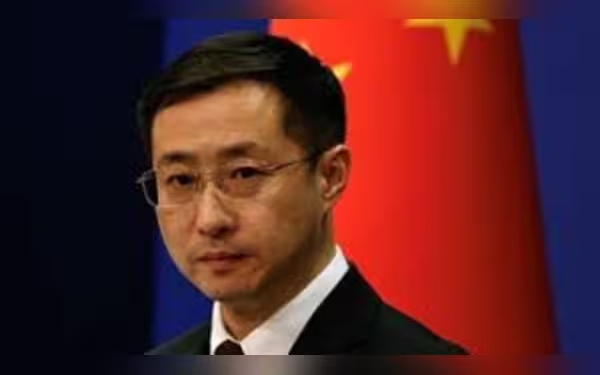Saturday, November 16, 2024 05:27 PM
China Freezes Assets of Nine US Firms Over Taiwan Arms Sales
- China freezes assets of nine US military-linked firms.
- Response to US arms sales to Taiwan escalates tensions.
- China urges US to halt support for Taiwan independence.
 Image Credits: thefrontierpost
Image Credits: thefrontierpostChina freezes assets of nine US firms in response to arms sales to Taiwan, escalating tensions and urging the US to cease support for Taiwan independence.
In a significant escalation of tensions between China and the United States, China has taken decisive action against nine US firms linked to military operations. This move comes in response to the ongoing arms sales from the US to Taiwan, a self-governing island that China considers a breakaway province. The Chinese government has frozen the property of these firms within its borders, signaling its strong disapproval of US support for Taiwan.
The firms affected by this property freeze include well-known companies such as Sierra Nevada Corporation and Stick Rudder Enterprises LLC. According to a statement from China's foreign ministry, these measures are described as "countermeasures" against the US for its military dealings with Taiwan. The list of firms also includes Cubic Corporation, S3 Aerospace, TCOM Ltd Partnership, TextOre, Planate Management Group, ACT1 Federal, and Exovera. The ministry has made it clear that organizations and individuals within China are prohibited from engaging in any transactions with these companies.
During a regular press briefing, a spokesperson for China’s foreign ministry, Lin Jian, urged the United States to "immediately stop the dangerous trend of arming Taiwan." This statement reflects China's long-standing position against US arms sales to Taiwan, which it views as a direct threat to its sovereignty and regional stability. Lin Jian further emphasized the need for the US to cease its support for Taiwan independence, calling for a halt to actions that undermine peace in the Taiwan Strait.
China's response is not unprecedented; it has previously sanctioned and banned other firms, including units of Lockheed Martin, for similar reasons. Over the past five years, China has intensified its military and political pressure to assert its claims over Taiwan, which the Taiwanese government firmly rejects. This ongoing conflict highlights the delicate balance of power in the region and the complexities of international relations.
As the situation continues to evolve, it is essential for both the US and China to engage in dialogue to prevent further escalation. The implications of these actions extend beyond just the firms involved; they affect regional security and international relations as a whole. Understanding the motivations behind these actions can help us grasp the broader context of the US-China relationship and the future of Taiwan.













